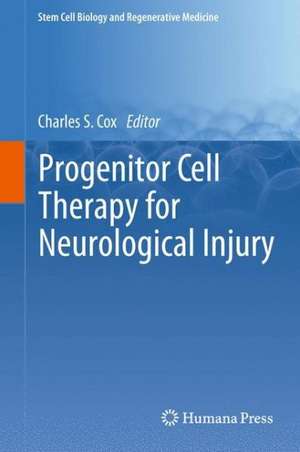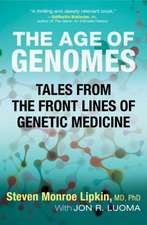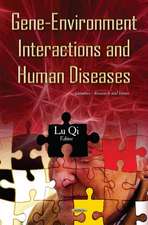Progenitor Cell Therapy for Neurological Injury: Stem Cell Biology and Regenerative Medicine
Editat de Charles S. Cox, Jr.en Limba Engleză Paperback – 27 dec 2012
| Toate formatele și edițiile | Preț | Express |
|---|---|---|
| Paperback (1) | 692.74 lei 6-8 săpt. | |
| Humana Press Inc. – 27 dec 2012 | 692.74 lei 6-8 săpt. | |
| Hardback (1) | 944.99 lei 6-8 săpt. | |
| Humana Press Inc. – 17 noi 2010 | 944.99 lei 6-8 săpt. |
Din seria Stem Cell Biology and Regenerative Medicine
- 15%
 Preț: 641.71 lei
Preț: 641.71 lei - 18%
 Preț: 625.04 lei
Preț: 625.04 lei - 18%
 Preț: 958.07 lei
Preț: 958.07 lei - 18%
 Preț: 897.65 lei
Preț: 897.65 lei - 18%
 Preț: 1122.56 lei
Preț: 1122.56 lei - 18%
 Preț: 1118.62 lei
Preț: 1118.62 lei - 18%
 Preț: 1556.64 lei
Preț: 1556.64 lei - 18%
 Preț: 1222.31 lei
Preț: 1222.31 lei - 18%
 Preț: 1280.72 lei
Preț: 1280.72 lei - 18%
 Preț: 948.61 lei
Preț: 948.61 lei - 18%
 Preț: 1280.24 lei
Preț: 1280.24 lei - 5%
 Preț: 779.16 lei
Preț: 779.16 lei - 18%
 Preț: 1278.02 lei
Preț: 1278.02 lei - 18%
 Preț: 947.35 lei
Preț: 947.35 lei - 18%
 Preț: 949.55 lei
Preț: 949.55 lei - 18%
 Preț: 951.29 lei
Preț: 951.29 lei - 18%
 Preț: 953.65 lei
Preț: 953.65 lei - 15%
 Preț: 691.12 lei
Preț: 691.12 lei - 18%
 Preț: 1220.75 lei
Preț: 1220.75 lei - 18%
 Preț: 956.81 lei
Preț: 956.81 lei - 15%
 Preț: 643.16 lei
Preț: 643.16 lei - 18%
 Preț: 1229.91 lei
Preț: 1229.91 lei - 15%
 Preț: 693.71 lei
Preț: 693.71 lei - 18%
 Preț: 944.99 lei
Preț: 944.99 lei - 18%
 Preț: 1222.01 lei
Preț: 1222.01 lei - 15%
 Preț: 696.18 lei
Preț: 696.18 lei - 18%
 Preț: 959.98 lei
Preț: 959.98 lei - 18%
 Preț: 963.91 lei
Preț: 963.91 lei - 18%
 Preț: 1380.47 lei
Preț: 1380.47 lei - 15%
 Preț: 690.44 lei
Preț: 690.44 lei - 15%
 Preț: 641.85 lei
Preț: 641.85 lei - 18%
 Preț: 1837.45 lei
Preț: 1837.45 lei - 15%
 Preț: 646.11 lei
Preț: 646.11 lei - 18%
 Preț: 1118.62 lei
Preț: 1118.62 lei - 5%
 Preț: 777.55 lei
Preț: 777.55 lei - 18%
 Preț: 1222.01 lei
Preț: 1222.01 lei - 18%
 Preț: 1241.73 lei
Preț: 1241.73 lei
Preț: 692.74 lei
Preț vechi: 814.99 lei
-15% Nou
Puncte Express: 1039
Preț estimativ în valută:
132.58€ • 137.88$ • 110.95£
132.58€ • 137.88$ • 110.95£
Carte tipărită la comandă
Livrare economică 14-28 martie
Preluare comenzi: 021 569.72.76
Specificații
ISBN-13: 9781617797170
ISBN-10: 1617797170
Pagini: 212
Ilustrații: X, 200 p.
Dimensiuni: 155 x 235 x 11 mm
Greutate: 0.3 kg
Ediția:2011
Editura: Humana Press Inc.
Colecția Humana
Seria Stem Cell Biology and Regenerative Medicine
Locul publicării:Totowa, NJ, United States
ISBN-10: 1617797170
Pagini: 212
Ilustrații: X, 200 p.
Dimensiuni: 155 x 235 x 11 mm
Greutate: 0.3 kg
Ediția:2011
Editura: Humana Press Inc.
Colecția Humana
Seria Stem Cell Biology and Regenerative Medicine
Locul publicării:Totowa, NJ, United States
Public țintă
Professional/practitionerCuprins
Preface.- Chapter 1. Basics of Stem and Progenitor Cells.- Chapter 2. Progenitor Cell Tissue Engineering: Scaffold Design and Fabrication.- Chapter 3. Stem Cell Delivery Methods and Routes.- Chapter 4. Neural Stem Cells-Endogenous Repair of Neurological Injury.- Chapter 5. Traumatic Brain Injury: Pathophysiology and Models.- Chapter 6. Traumatic Brain Injury: Relationship of Clinical Injury to Progenitor Cell Therapeutics.- Chapter 7. Cell-Based Therapy for Stroke.- Chapter 8. Spinal Cord Injury: Pathophysiology and Progenitor Cell Therapy.- Chapter 9. Current Status of Clinical Trials using Progenitor Cells for Neurological Injury
Recenzii
From the reviews:
“This book is an example of the cumulative effort over the past few years. The purpose is to address the use of progenitor cells in the management of neurological diseases. … Neurologists, neurosurgeons, neurophysiologists, neuroscientists, and molecular biology and transplantation scientists are the intended audience. … The book is well written, referenced, and illustrated.” (Celso Agner, Doody’s Book Reviews, April, 2012)
“This book is an example of the cumulative effort over the past few years. The purpose is to address the use of progenitor cells in the management of neurological diseases. … Neurologists, neurosurgeons, neurophysiologists, neuroscientists, and molecular biology and transplantation scientists are the intended audience. … The book is well written, referenced, and illustrated.” (Celso Agner, Doody’s Book Reviews, April, 2012)
Textul de pe ultima copertă
There are currently no reparative therapies for severe neurological injury, including brain injury, spinal cord injury and stroke. Actually, most treatments are designed simply to limit secondary damage. However, pre-clinical data supports the idea that exogenous stem and progenitor cells have the potential to promote a reparative response to severe neurological injuries. Progenitor Cell Therapy for Neurological Injury is a compilation of seminal essays that explore many unique aspects of neurological injury, focusing on the critical translational issues of cell delivery. Specifically, it discusses routes of administration, types of progenitor cells (alone and/or in combinations), timing of delivery and adjuncts to promote cell engraftment, survival and effectiveness. In addition, many chapters address measuring the effects of transplanted cells and cell tracking.The paradigms of how cell-based therapeutics affect neurological injury is changing rapidly. The developments in this field may ultimately offer realistic hope for improvement in patients with severe injuries. This book is a vital key toward unlocking those future treatments.
Caracteristici
The text provides an up-to-date focused review on non-embryonic progenitor cell therapeutics for neurological injuries Translational barriers to adoption of progenitor based cell therapeutics is a central theme of the text This is a single source for a broad overview of the status of pre-clinical proof of concept data and early translational trials using progenitor cells for neurological injury Includes supplementary material: sn.pub/extras














